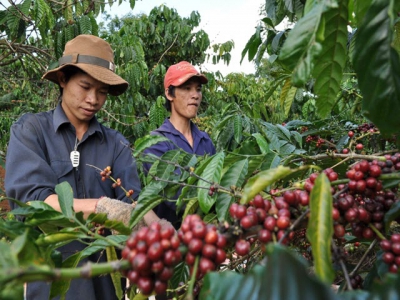Bayer, Nestlé enhance Vietnams agricultural value chains

The disruption of agricultural product value chains resulting from the Covid-19 pandemic has underlined the vital importance of domestic agricultural development, according to Deputy Minister of Agriculture and Rural Development Le Quoc Doanh. Specifically, he said, public-private partnerships (PPPs) are an important format to attract investment in agriculture in general and in deep processing in particular, develop value chains, create added value and ensure food safety.
The Partnership for Sustainable Agriculture in Vietnam (PSAV) was initiated in 2010 under the World Economic Forum’s (WEF) New Vision for Agriculture Initiative (NVA). It set a goal of increasing agriculture productivity by 20 percent, a 20 percent reduction in carbon emissions and 20 percent reduction in the poverty rate for each decade until 2050. The Ministry of Agriculture and Rural Development (MARD) and 15 international enterprises, among them multinational corporations such as ADM, Bunge, Cargill Inc, Cisco Vietnam, Nestlé, PepsiCo Vietnam, Bayer Vietnam and Swiss Re, established the PPP model in agriculture industries in order to connect actors in the industry, share experiences and jointly develop the value chain of Vietnam’s key agricultural products.
So far, eight working groups of the PPP model have been created in various sectors, such as coffee, tea, vegetable and fruit, fisheries, pepper, rice and agricultural chemicals with the participation of more than 120 organizations, including government agencies, companies, industry associations, research institutes, international and non-governmental organizations.
The PPP model has yielded practical results, creating many sustainable, environmentally friendly demonstration models, increasing farmer incomes and creating a value chain of quality products meeting import market standards, improving competitiveness, and expanding markets for agricultural products and goods.
‘Better Farms, Better Lives’
Christoph Meinert, a representative of the Board of Directors of Bayer Vietnam, said the company had collaborated with its partners to offer digital solutions, helping boost the competitiveness and sustainability of Vietnam’s agriculture.
Notably, in order to promptly support smallholder farmers in coping with the Covid-19 pandemic and drought and saltwater intrusion, especially in the Mekong Delta, Bayer is coordinating with relevant agencies to implement a global initiative titled “Better Farms, Better Lives” in Vietnam. The program will support 80,000 farmers by providing free “Better Life Farming” care packages tailored to local needs. These will include Bayer’s seeds and crop protection products and corresponding training materials in order to restore production and deal with adverse situations such as drought, saltwater intrusion, and Covid-19 pandemic, ensuring that agricultural products can meet food safety and international standards.
According to Binu Jacob, General Director of Nestlé Vietnam, the company has deployed the global NESCAFÉ Plan initiative on sustainable coffee development over the past decade, enhancing Vietnamese coffee’s value and quality and improving farmers’ lives. The program not only has improved 46,000 hectares of old coffee cultivation land in the Central Highlands region through replanting activities, but also trained more than 260,000 farmers in sustainable farming techniques with the participation of agricultural engineers in order to raise farmers’ awareness. The program has increased farmers’ income by 30-100 percent in the past decade. In addition, water use has decreased by 40 percent, and the use of agrochemicals and crop protection products has decreased by 30 percent.
According to experts, the support from Bayer, Nestlé and other members of PSAV has opened a window of opportunity for Vietnam’s agricultural industry to develop sustainably and increase its competitiveness. It has also helped improve institutions and policies in the agricultural sector, supported the strengthening and replication of successful models, and promoted the attraction of PPP investments in the agricultural sector.
Related news
 Six local firms participate in online international agricultural exhibition in Algeria
Six local firms participate in online international agricultural exhibition in Algeria The event was co-organised by Andalus Trade, Show, Exhibits & Events Company (TSEE) in collaboration with Algerian media agencies
 Luc Ngan strives to become national key fruit growing area
Luc Ngan strives to become national key fruit growing area Blessed with favourable natural conditions and hard working people, the land of Luc Ngan produces many types of delicious fruits making this land
 Hanoi transforms into husbandry breeding powerhouse
Hanoi transforms into husbandry breeding powerhouse The capital city had 3,150 farms, 500 more than in 2015. The farms supply residents with hundreds of thousands of tonnes of food, meat, vegetables and fruit